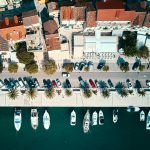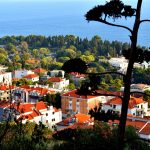Dubrovnik’s most visible war wound, from a glamorous, thriving hotel, to a silent and imposing ruin.
If you’ve spent any time in Dubrovnik since the Homeland War ended, you’ll have noticed what can truly only be described as an eye-sore located at the very edge of the city, built along the jagged rocks of the coastline in the elite, residential area of Sveti Jakov, east of the Old City.
What is now an abandoned, derelict shell, and has been for over two decades, was once one of the most elite hotels on the Adriatic. Dubrovnik’s prestigious Hotel Belvedere attracted guests from far and wide, most of them wealthy, as it boasted an incredible view over the sparkling Adriatic sea, the nearby island of Lokrum and the UNESCO Old City, coupled with the comfort of an ideal, quiet, and otherwise primarily residential location of the city.
August Dominus
August Dominus
This now ghostly building is one of the casualties of war that is undoubtedly more visible than any other that can be seen at first glance in Dubrovnik, with the rest of the city recovering incredibly well after the Homeland War, and after the Siege of Dubrovnik saw Croatia’s southernmost destination become the target of constant shelling, gunfire, and looting at the hands of the JNA (Yugoslav People’s Army) and their Serbian-Montenegrin counterparts.
While Dubrovnik has made the transition a war-torn city in the former Yugoslavia to one of the most attractive tourist destinations on the planet, in the increasingly popular new tourism star of the European Union – Croatia, Hotel Belvedere remained trapped in time, unable to move with the times, as if a clock had stopped ticking in the 1990’s, never to have had its batteries replaced again.
August Dominus
Once filled with the sound of music, laughter and voices, and now reduced to a mere ruin, one of Dubrovnik’s most obvious war wounds now stands deafeningly silent under the warm summer sun, music replaced by the sound of crickets, facing ominously into the distance, in stark contrast to its joyful, peace-time surroundings. The only life that can be found today on Hotel Belvedere’s grounds are the local street cats, lounging in the sun and wallowing in their eternal desire for a passerby to offer them a snack, a far cry from the past.
Nestled into the steady slope of the mountainside and located just over a kilometer from the famous Old City, the formerly glamorous Hotel Belvedere operated for six seasons running, opening back in 1985, before the outbreak of the Homeland War and the subsequent collapse of Yugoslavia, until 1991, which saw the luxurious hotel all but destroyed, one of the many victims of the JNA’s primitive and wanton destruction of Dubrovnik, and one that was not to recover.
August Dominus
Far from a small, modest complex, the former luxury hotel boasted 200 rooms with over 400 beds, as well as two apartments, 19 suites and an enviable presidential suite. Popular with tourists and businesspeople alike, the hotel also had the ”New Orleans” meeting room with a 150 seat capacity. International cuisine wasn’t an issue either, with several high-end restaurants serving everything from domestic dishes to French cuisine. The Croatian national restaurant ”Konavle”, named after the country’s southernmost county, just a short drive from Dubrovnik itself, was particularly popular with guests wanting a true taste of Croatia.
Taverns, cafes and bars were also aplenty, one of the most popular being ”Elafiti” tavern, named after Dubrovnik’s main three nearby Elafiti (Elaphite) islands – Koločep (Kalamota), Lopud, and Šipan. The hotel also boasted a well equipped massage salon with a sauna, a hairdresser’s salon, indoor and outdoor pools, several boutiques, and more.
August Dominus
The brutal architecture of this delapidated, haunting building, although abandoned, entirely neglected, and completely out of ”tune” with the rest of the city, serves as a blunt reminder of Dubrovnik’s now barely recognisable yet very recent past, and forces the ugly face of war into the forefront of our minds as the rest of Dubrovnik moves on from the dark days and the suffering it had to go through to gain its independence.







